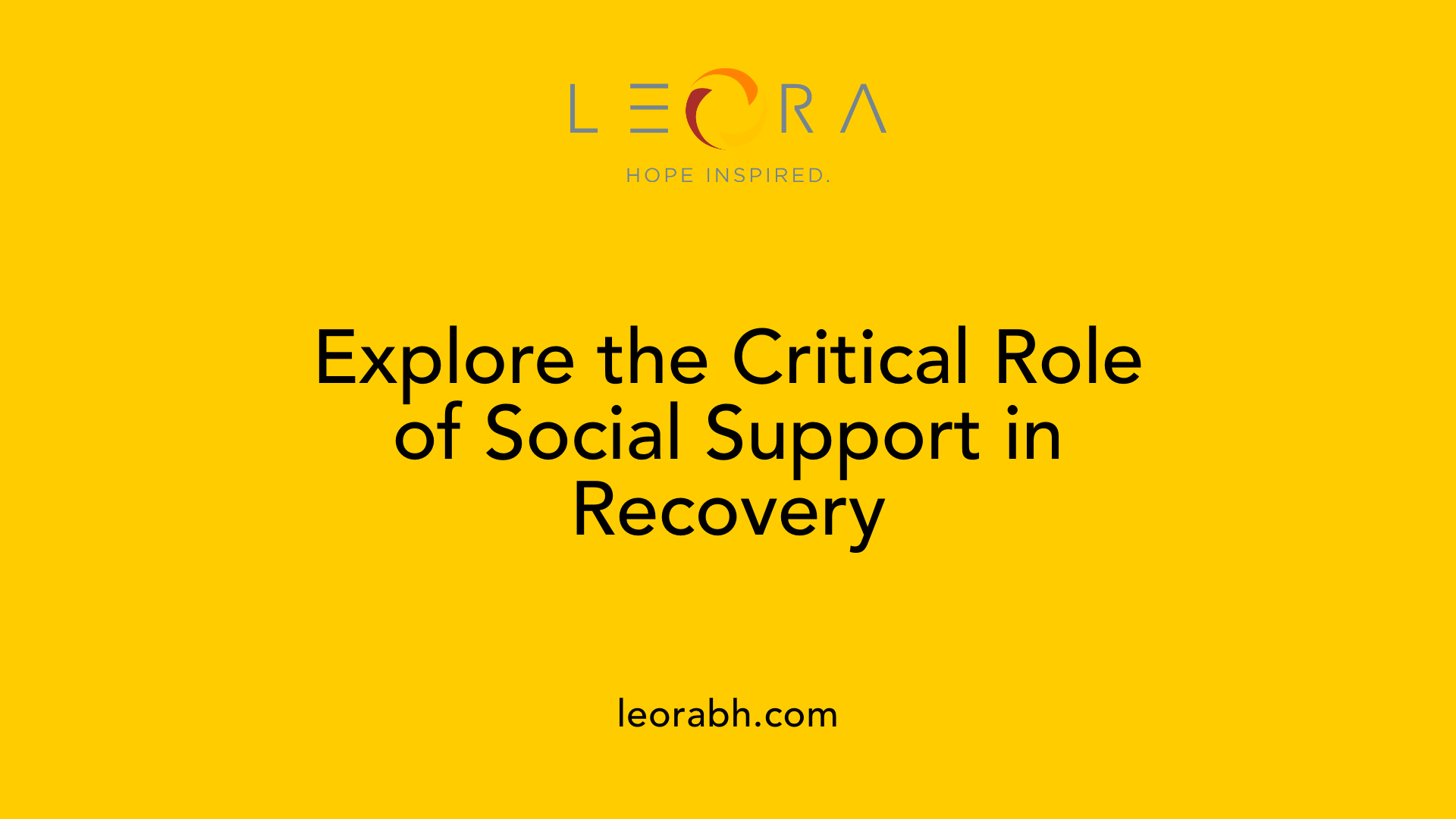The Importance of Building a Support Network in Recovery
Harnessing the Power of Support Networks for Sustainable Recovery
Introduction: The Backbone of Successful Recovery
Recovery from substance use disorders is a challenging journey that requires more than just individual determination. A robust support network has been identified as an essential element for achieving and maintaining sobriety. This article explores why building and sustaining social support is critical to recovery success and how individuals can cultivate these life-saving relationships.
Understanding the Role of Support Networks in Recovery

The role and significance of social support in recovery
Social support serves as a cornerstone in the journey of recovery from addiction. It offers individuals emotional backing, which is crucial for maintaining motivation and resilience against relapse. Support networks can include family, friends, healthcare professionals, and peer groups, each contributing vital encouragement and understanding throughout the recovery process.
Research indicates that having a solid support system directly correlates with better treatment outcomes, including lower rates of substance use, improved treatment retention, and higher rates of abstinence. Enhanced social connections can help rebuild self-esteem and foster a sense of belonging, making recovery a more manageable and hopeful experience. Furthermore, a supportive environment alters individuals’ attitudes towards sobriety, creating positive expectations and encouraging healthier behaviors.
How support networks help mitigate loneliness and isolation
Loneliness is often a significant trigger for relapse, making it imperative to combat feelings of isolation that many individuals face during recovery. Social support networks provide a sense of community, connecting individuals with like-minded peers who share similar experiences. This connection is not only comforting; it is essential for long-term sobriety.
Support groups and sober networks, such as Alcoholics Anonymous (AA) or alternative programs, facilitate interactions that reduce stigma and foster accountability. Participating in social activities enhances these bonds, reinforcing that joy and fulfillment can be found outside of substance use. Consequently, healthy socialization nurtures resilience against stressors, further promoting well-being and stability during recovery.
By establishing open channels of communication, support networks not only reduce feelings of loneliness but also encourage individuals to share their challenges and victories. This reciprocal support significantly enhances recovery outcomes and cultivates a nurturing environment for personal growth.
Benefits of a Strong Support Network in Recovery

How can building a strong support network benefit someone in recovery?
Building a strong support network benefits individuals in recovery by providing essential encouragement, guidance, and emotional support. Peer support is particularly valuable, as those who have faced similar challenges can offer empathy and understanding. Individuals with robust support systems are statistically less likely to relapse; they can draw motivation from observing others' successes, reinforcing their commitment to sobriety.
Some critical components of a strong support network include:
- Sober friends: Companions who share a commitment to sobriety foster a sense of community.
- Formal support groups: Organizations like Alcoholics Anonymous (AA) or Narcotics Anonymous (NA) provide structured environments for sharing experiences.
- Sponsors: These experienced individuals guide those in recovery, helping navigate challenges and serving as accountability partners.
- Therapists: Mental health professionals assist in coping strategies and emotional wellness.
Maintaining open communication with family and friends increases the strength of this network while engaging in sober social events solidifies these connections.
Impact on motivation and well-being
The presence of a support system significantly enhances motivation and overall well-being. Through accountability, individuals are more likely to remain steadfast in their recovery goals during challenging times. Furthermore, connections with sober peers can decrease feelings of isolation and loneliness, which are common triggers for relapse.
Engagement in supportive activities such as group outings, volunteering, or participating in recreational events provides opportunities to celebrate progress and maintain a positive environment. This fosters emotional resilience, enhancing one's self-esteem and encouraging healthier lifestyle choices, ultimately reinforcing the journey to a rewarding, substance-free life.
Thus, the coherence of a support network is crucial, especially in the early stages of recovery, promoting both emotional stability and long-term success.
Practical Strategies for Building a Support System

What are practical strategies for establishing and improving a support network during recovery?
Building a robust support system is crucial for individuals in recovery. Here are several effective strategies to establish and enhance your network:
Join Support Groups: Engaging in groups like Alcoholics Anonymous (AA) or Narcotics Anonymous (NA) can provide valuable connections with peers who understand your journey. These meetings foster community and accountability.
Identify Supportive Individuals: Look for trusted friends and family members who can offer encouragement. Communicating your needs honestly allows them to understand how best to support you.
Engage with Professionals: Counselors or therapists not only provide personalized guidance but also emotional support, helping you navigate challenges in recovery.
Participate in Community Activities: Volunteering or joining local groups enhances social interactions and helps build positive relationships that align with your sobriety goals.
Leverage Online Resources: Use technology to connect with others in recovery through online forums, social media groups, or virtual support meetings. This can be especially helpful for individuals with limited access to local resources.
Set Healthy Boundaries: Distancing yourself from relationships that may trigger relapse is vital. Surround yourself with individuals who support sobriety and promote healthy behaviors.
Establishing a strong support network not only reinforces your recovery journey but also helps cultivate a lifestyle of emotional and practical support.
The Emotional and Motivational Gains of Community Support

What are the emotional and motivational benefits of having a supportive community during recovery?
A supportive community during recovery offers essential emotional benefits that significantly enhance an individual’s journey. Primarily, it fosters a sense of belonging, acceptance, and understanding, which are vital for healing and personal growth. Individuals often feel less isolated, as connecting with peers who share similar addiction experiences helps alleviate feelings of loneliness and despair.
Emotionally, sharing struggles and victories within a community provides comfort and validation. Members of a support network can share insights and encouragement, which promotes psychological wellness. Together, they create an environment where open communication is encouraged, allowing individuals to express their feelings without judgment.
Motivationally, community support plays a substantial role in encouraging individuals to stay committed to their recovery goals. Accountability is heightened as individuals witness the progress of their peers, motivating them to adhere to their own pathways. Observing others successfully maintain sobriety not only inspires but instills hope, reinforcing the belief that recovery is achievable. This reciprocal encouragement fosters a nurturing atmosphere crucial for long-term recovery success.
Facilitating Accountability and Effective Communication
Role of accountability in maintaining sobriety
Accountability is a critical component of a successful recovery journey. When individuals engage with a sober support network, such as sponsors or peer groups, they establish mutual commitments that enhance their pledges to remain sober. This engagement fosters a sense of responsibility; knowing that others are invested in one's progress can make it easier to resist temptation and stay focused on recovery goals.
Importance of communication within support networks
Communication plays a vital role in nurturing relationships within recovery support networks. Open and honest dialogue helps individuals share their struggles and triumphs, alleviating feelings of isolation that often accompany addiction. Regular check-ins, whether in-person or through technology, can strengthen these bonds and provide necessary emotional support. Encouragement and validation through communication can uplift spirits and offer guidance during challenging times in recovery.
Overcoming Barriers to Building Support Networks
Common Barriers to Support Networks
Building a sober support network can be challenging, often hindered by common barriers. Stigma surrounding addiction creates a hesitancy for individuals to reach out for help, fearing judgment or misunderstanding from others. Additionally, many individuals lack awareness about the resources available to them, which can leave them feeling isolated. This isolation can exacerbate feelings of loneliness, increasing the risk of relapse.
Strategies to Overcome Barriers
Overcoming these barriers requires proactive strategies. First, education is crucial; increasing awareness of addiction issues can empower individuals to seek help without fear. This includes sharing informative resources and personal success stories to highlight the possibilities of recovery.
Another approach is fostering open communication about addiction, allowing individuals to express their struggles and needs.
Engagement in local support groups like AA or alternative programs such as SMART Recovery can provide safe spaces to connect with others who understand these challenges. Using online platforms can further enhance accessibility, creating connections that transcend geographical limitations.
Additionally, establishing strong family relationships can provide immediate support, ensuring individuals have a reliable foundation as they embark on their recovery journey.
Long-term Benefits of a Robust Support Network

A support network's role in relapse prevention
A strong support network acts as a safety net during recovery, crucial in preventing relapse. When individuals surround themselves with sober peers, they increase their chances of maintaining sobriety significantly. Support groups such as Alcoholics Anonymous (AA) and Narcotics Anonymous (NA) foster connections that provide empathy, understanding, and encouragement.
Additionally, support networks help monitor behaviors, recognizing potential triggers and warning signs before a relapse occurs. Having accountability through these connections motivates individuals to make healthier choices and stay committed to their recovery goals. Through encouragement and shared experiences, those in recovery can navigate the challenges of everyday life without succumbing to the pressures of substance use.
Enhancing quality of life through lasting connections
The emotional benefits of a strong support network are undeniable. Individuals who engage with supportive family, friends, and peers often experience lower stress levels and improved mental health. By fostering a sense of belonging, these connections can enhance overall well-being and lead to a higher quality of life.
Meaningful relationships built within a support network can also promote self-efficacy and resilience. People with a stable network are more likely to experience happiness and contentment, contributing positively to their recovery journey. This social support serves not only as a source of strength but also as a motivator, inspiring individuals to participate in sober activities, foster new relationships, and engage with their communities.
Conclusion: Embracing the Supportive Path to Sobriety
Building a support network is an indispensable part of the recovery process, offering more than just companionship—it serves as an anchor in times of difficulty and a celebratory presence during successes. As individuals embark on the journey to sobriety, understanding the role of social support can improve their chances of a thriving, substance-free life. By actively engaging with peers and utilizing available resources, those in recovery can overcome obstacles, find shared strength, and lay the foundation for a healthier and more fulfilling future.
References
- The Importance of Social Support in Recovery Populations
- Importance of a Sober Support Network - Pinelands Recovery Center
- Building a Healthy Support System in Recovery - Addictions
- The Importance of Support Networks in the Recovery Process
- How to Build a Sober Support Network in Recovery | All Points North
- The Importance of Social Support in Addiction Recovery
- Building a Sober Support Network: The Bedrock of Recovery
- Building a support network: Friends & family in recovery | Delamere
- The Crucial Role Of Support Networks In Addiction Recovery
- How to Create a Supportive Network for Recovery
Find Your Inner Light
Related Articles
Contact Us
Leora Behavioral Health offers a comprehensive addiction treatment programs to help you get your life back on track.
Our trained professionals will work with you to develop a personalized treatment plan that meets your unique needs. If you or someone you know is struggling with addiction, reach out to Leora Behavioral Health today.


.svg)





.svg)
.svg)
.svg)
.svg)